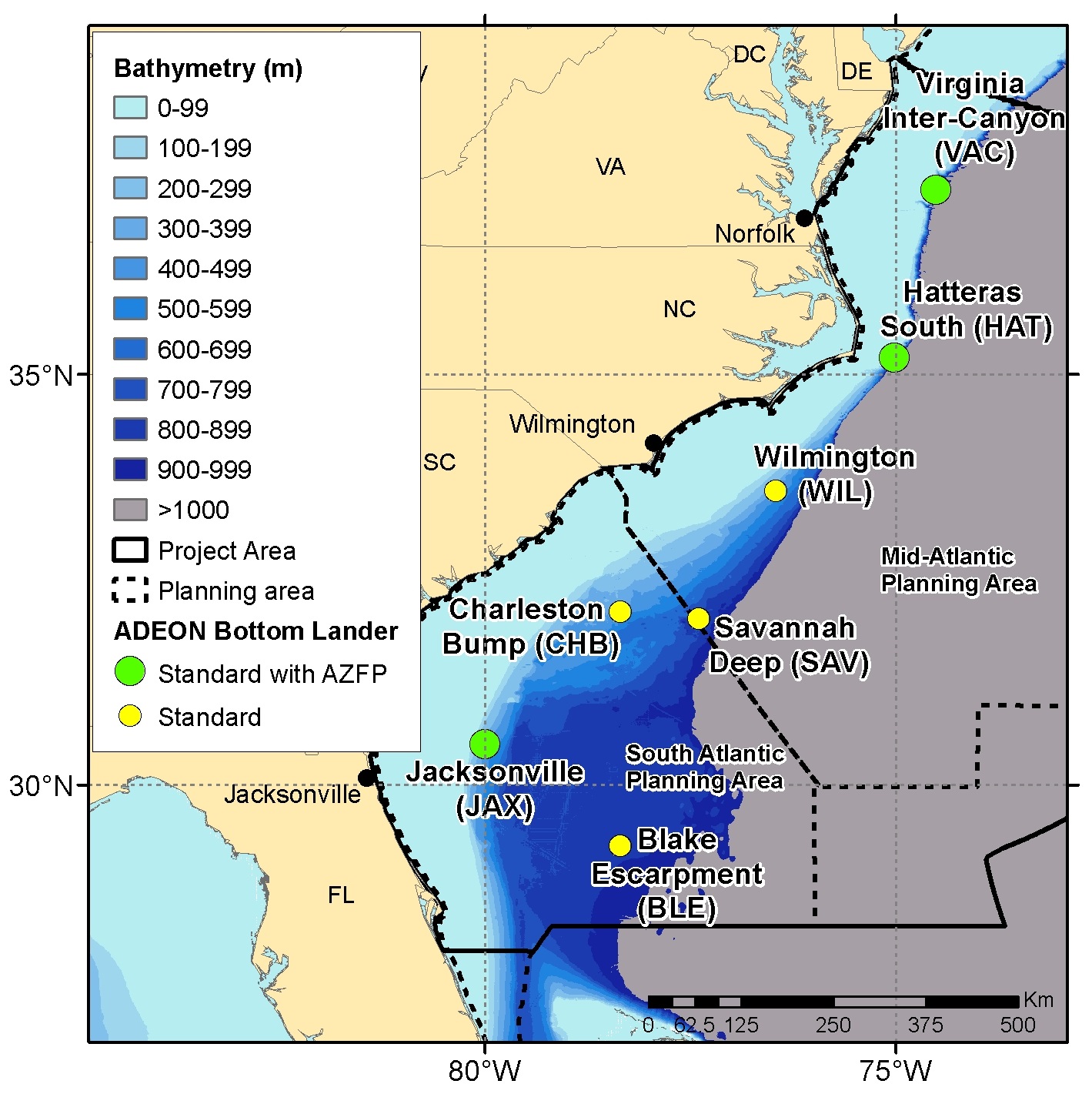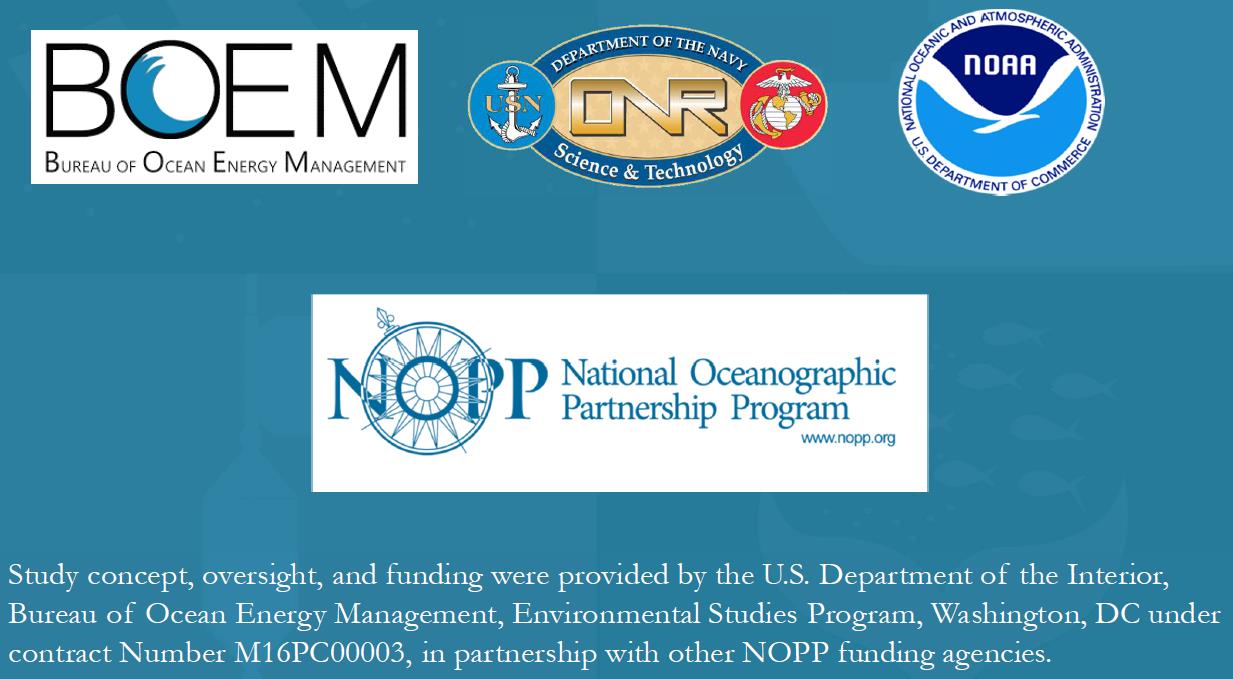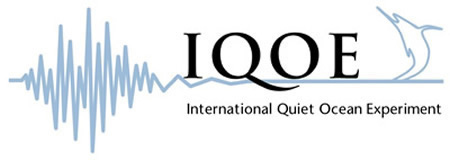Cruise Date |
Cruise Name |
Cruise Purpose |
Cruise Reports |
|---|---|---|---|
|
Nov 2017 |
AR025 |
Fall 2017 was the first trip conducted to deploy ocean bottom-landers and collect ship-board data for ground-truthing, inter-calibration of lander data, and the examination of spatial and temporal patterns in ocean sound along with the distribution and abundance of biological organisms in the study region. |
AR25 Cruise Report |
| June 2018 | EN615 |
The objectives for this cruise were to recover bottom landers at seven sites along the shelfbreak (depths ranging from 200 – 900 m roughly), redeploy a bottom lander at each site after downloading its data, collect CTD profiles to characterize hydrographic conditions at the sites, conduct net sampling to collect biological specimens at each site, and conduct fine-scale (roughly 8 km by 8 km) multi-frequency acoustic surveys at each site. In addition, we collected animal specimens from net tows for collaborators associated with the DEEP SEARCH project as well as collecting water samples for eDNA analysis for DEEP SEARCH and other collaborators. |
EN615 Cruise Report |
| Nov 2018 | EN626 |
The objectives for this cruise were to recover bottom landers at seven sites along the shelf break (depths ranging from 200 – 900 m roughly), redeploy a bottom lander at each site after downloading its data, collect CTD profiles to characterize hydrographic conditions at the sites, conduct net sampling to collect biological specimens at each site, and conduct fine-scale (roughly 8 km by 8 km) multi-frequency acoustic surveys at each site. We were able to complete the lander turnarounds at all seven locations successfully, but poor weather for a large portion of the trip prevented us from completing all scheduled sampling at all sites. In addition, at several ADEON sites we collected animal specimens from net tows for collaborators associated with the DEEP SEARCH project as well as water samples for eDNA analysis for DEEP SEARCH and other collaborators. We were also able to conduct one net trawl at a DEEP SEARCH site Million Mounds. |
EN626 Cruise Report |
| Nov 2019 | AR040 |
This expedition is the fourth of five cruises for this project focused on recovery, turnaround, and redeployment of bottom landers at seven sites along the outer continental shelf (OCS) of the United States east coast. In addition to the lander work, station sampling will occur at each location consisting of CTD profiles, net trawls for biological specimens, and a fine-scale, lawnmower pattern active acoustic survey using the hull-mounted echo sounder on the RV Armstrong. |
AR040 Cruise Report |
| Dec 2020 | AR049 |
The objectives for this cruise were to recover bottom landers at six sites along the shelf break (depths ranging from 200 – 900 m roughly), collect CTD/XBT profiles to characterize hydrographic conditions at the sites, conduct net sampling to collect biological specimens at each site, and conduct fine-scale (roughly 10 km by 10 km) multi-frequency acoustic surveys at each site. Lander recovery was only planned at 6 of the 7 ADEON sites because the VAC lander was trawled up prematurely by a fisherman in July 2020. We were able to successfully recover all of the landers deployed during ADEON Cruise 4 AR049 and an additional JAX lander that was deployed in 2018. ROV Jason was used to recover the landers at the WIL site and the JAX site. |
AR049 Cruise Report |
Horizontal Line Array Sail Cruises
Cruise Date |
Cruise Name |
Cruise Purpose |
Cruise Report |
| 30May18 - 3Jun18 | ADEON Sail Cruise #1 |
In order to better understand the spatial structure of the soundscape field, the ADEON team proposed a set of mobile horizontal line array (HLA) measurements, to coincide with the ADEON data recovery cruises. With a mobile array system, the sound field between two moorings can be collected, and compared with the recordings at each lander. This measurement will give us an estimate of the horizontal correlation length of the ocean soundscape. This is an important scientific issue as we seek to understand the ability of a single measurement to extrapolate in space. Recordings from a towed array also provide the horizontal directionality of the sound field. |
Sail Cruise 1 Report |
| 3June19 - 8June19 | ADEON Sail Cruise #2&3 |
A five-day acoustical survey in support of the BOEM Atlantic Deepwater Ecosystem Observatory Network (ADEON) program was conducted on the U. S. east coast Outer Continental Shelf (OCS) from June 3-8, 2019. The planned survey route was designed to sample the ambient noise environment in the vicinity of three ADEON landers located at Charleston Bump (CHB), Savannah Deep (SAV) and Wilmington (WIL). |
Sail Cruise 2&3 Report |
| 2Dec20 - 7Dec20 | ADEON Sail Cruise #4 |
To address the 4th program objective of determining the spatial and temporal distribution of the soundscape a set of four sailboat cruises with a towed horizontal line array (HLA) were planned. The first three cruises have been completed; this report describes the 4th and final cruise for ADEON. The route began at the Charleston Sea Buoy. From there, to the Jacksonville mooring (JAX) where we would turn north towards the Charleston Bump (CHB), recording ambient sound for the leg from JAX-CHB. The objective was to measure ambient ocean sound at multiple ranges from each of the JAX and CHB landers, in order to examine the spatial and temporal correlation scales of the soundscape. |
Sail Cruise 4 Report |
Bottom-Lander Deployments
The two visualizations shown below depict the R/V Armstrong travel path and activities as they occurred during the November 2017 ADEON network deployment cruise (reference 2017_AR25).
| The video above depicts the path traveled during the deployment of the ADEON network. | The video above depicts a data gathering transection path over the ADEON bottom-lander area named Virginia Inter-Canyon (VAC). |



